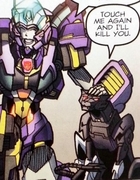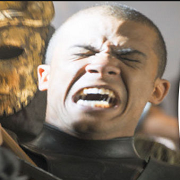|
theironjef posted:What always hitches me on PBTA games is that the first thing anyone ever taught me about them is "As a player, you don't pick moves during play. You just say what your character does, and the GM will tell you what moves to roll." So my first thought was "Wow, lot of pressure on the GM to remember all these." Well, that's because they taught you wrong. Probably not as a joke, either - I see a lot of people get that same wrong impression about PbtA somehow, even though they tell you different right up front: Apocalypse World 2e posted:The rule for moves is to do it, do it. In order for it to be a move and for the player to roll dice, the character has to do something that counts as that move; and whenever the character does something that counts as a move, it's the move and the player rolls dice. The idea is that as a player, you provide both the name of the move and the fictional action you're doing, because all the player moves are mechanical recipes with both mechanical and fictional consequences: "I'm gonna Unleash My Powers to wrap Scorched Earth up in vines and slam him to the ground!" The GM gets a directive not to say what moves they're using, only to present the fictional circumstance, and that's because all the GM moves are plot prompts with no mechanical hooks, so saying them won't help. Not: "I'm going to tell you the requirements or consequences and then ask", just: "Is that really gonna work? My boy is fireblasting the ground with aplomb over here, but I guess it would be a pretty good unleash to grow something up to him in, like, the couple seconds his back is turned. You're not gonna be able to get him all the way to ground just from that, but you will give him a few high-priority targets to focus on so somebody else can directly engage him without getting suppressively fired. Fair warning, though: if you don't hit this clean, one of those targets is gonna be you. We good?"
|
|
|
|

|
| # ? May 28, 2024 05:46 |
|
Arrrthritis posted:I think what put me off of PbtA stuff was when "Success with complications" usually had complications that were worse than if I did nothing. I'm sure that's very much a GM-dependent aspect of it, though. Yeah that's incorrect, you should always fundamentally get what you wanted. Granted, on the player side of PbtA you have to realize the whole structure of the game is meant to be a back and forth conversation, complications from rolls are one of the main driving forces of " what happens next". By the game rules, "doing nothing" would not have been a better outcome as MCs are told to follow up setup with the next thing that follows, if a player refuses to act the MC is at liberty to make a hard move and proceeded like you rolled 6 or less essentialy.
|
|
|
|
Ash Rose posted:Yeah that's incorrect, you should always fundamentally get what you wanted. Granted, on the player side of PbtA you have to realize the whole structure of the game is meant to be a back and forth conversation, complications from rolls are one of the main driving forces of " what happens next". By the game rules, "doing nothing" would not have been a better outcome as MCs are told to follow up setup with the next thing that follows, if a player refuses to act the MC is at liberty to make a hard move and proceeded like you rolled 6 or less essentialy. So a standard 'with a cost' example would be 'you get the door open but you hurry the job and the alarm goes off?'
|
|
|
|
Dawgstar posted:So a standard 'with a cost' example would be 'you get the door open but you hurry the job and the alarm goes off?' Depends on if the move was about getting the door open or being undetected, but potentially yeah.
|
|
|
|
Thatís one of the things Blades really succeeds on with its evolution on the system. Position and Effect codify those costs before the roll and also give degrees of success/consequences. Itís not really any more work for the GM, it more reigns in their decision space mechanically.Glazius posted:The idea is that as a player, you provide both the name of the move and the fictional action you're doing, The section you quoted even points out that itís the GMs job to deal with Moves being made when the player expressly doesnít say the name of the move. \/ What happens? Bottom Liner fucked around with this message at 18:44 on Feb 2, 2023 |
|
|
|
That happens in any fail forward or fail sideways game, though. You just have to face it and ride the roller coaster, and bear in mind that the trade off is that the GM doesnít have to set dumb puzzles or railroad for non-combat challenges to make a big difference.
|
|
|
|
Fail forward/success (or failure) with consequences/complications is a skill and like any skill it takes practice and also it's really really helpful to be tutored. Along that line, are there some videos of actual play that are actually actual play, like by the rules, for some of these games? Real world examples can be tremendously helpful in getting a gut feel for how it's "supposed to work".
|
|
|
|
Pretty much every game gives a list of exactly how to do it relative to the fiction. PbtA calls it Hard and Soft moves depending on how bad you want things to go. It can be as simple as damaging an item or introducing a new threat or as severe as causing major harm to a character (or key NPC).quote:
|
|
|
|
Arrrthritis posted:I think what put me off of PbtA stuff was when "Success with complications" usually had complications that were worse than if I did nothing. I'm sure that's very much a GM-dependent aspect of it, though. It is, and part of the challenge as the GM to make it so the move still feels like success while providing those complications. The GM's job in those games is to make the characters lives interesting, not to frustrate the players. It can be a tricky line to walk at times.
|
|
|
|
Leperflesh posted:Fail forward/success (or failure) with consequences/complications is a skill and like any skill it takes practice and also it's really really helpful to be tutored. Along that line, are there some videos of actual play that are actually actual play, like by the rules, for some of these games? Real world examples can be tremendously helpful in getting a gut feel for how it's "supposed to work". The Adventure Zone has recently started a Blades in the Dark (custom setting) season. It's hit a nice spot of listenability for me (I normally bounce off actual plays), and it has helped me work on some aspects of the system while I'm trying to run it for my group when none of us at the table have experience with it.
|
|
|
|
I think an easy trap for new PbtA GMs to fall into, regardless of whether they come from a traditional RPG background or not, is that every consequence has to be "interesting." And while narrative consequences are often the most interesting they can lead to that feeling that you were better off doing nothing at all. Just realizing that some consequences can be "boring" -- damage, item loss -- or not actually effect the immediate situation -- show them the barrel of the gun, introduce a high-level threat -- really helps run PbTA games.
|
|
|
|
admanb posted:I think an easy trap for new PbtA GMs to fall into, regardless of whether they come from a traditional RPG background or not, is that every consequence has to be "interesting." And while narrative consequences are often the most interesting they can lead to that feeling that you were better off doing nothing at all. Just realizing that some consequences can be "boring" -- damage, item loss -- or not actually effect the immediate situation -- show them the barrel of the gun, introduce a high-level threat -- really helps run PbTA games. If you havenít seen the new sheets released theyíre really great for distilling and guiding the game: https://evilhat.com/wp-content/uploads/2023/01/blades_core_playsheets.pdf
|
|
|
|
Arrrthritis posted:I think what put me off of PbtA stuff was when "Success with complications" usually had complications that were worse than if I did nothing. I'm sure that's very much a GM-dependent aspect of it, though.
|
|
|
|
Raiders of the Lost Ark is a great example of fail forward, just without rules or dice. Indy is mostly rolling 7-9s here. https://www.youtube.com/watch?v=yqQD8sVtfA4
|
|
|
|
I think 10+ would be Indy shooting the one Nazi on a tank near the end of The Last Crusade, and the bullet blows a hole through three of them in a row. https://www.youtube.com/watch?v=U6tzqlxOr2U&t=21s (So, what would "Belloq opens the Ark of the Covenant, and the literal Wrath of God flash-fries or melts a bunch of Nazis" be?)
|
|
|
|
Snorb posted:I think 10+ would be Indy shooting the one Nazi on a tank near the end of The Last Crusade, and the bullet blows a hole through three of them in a row. Botch. Belloq rolled a big old stack of ones. So did Donavan on his Grail knowledge check.
|
|
|
|
joylessdivision posted:Botch. Belloq rolled a big old stack of ones. So did Donavan on his Grail knowledge check. I think Donovan was more "critical failure on a Sense Motive action vs. Elsa's Deception check."
|
|
|
|
The hard failures are more of a problem than success at cost, honestly.
|
|
|
Leperflesh posted:Fail forward/success (or failure) with consequences/complications is a skill and like any skill it takes practice and also it's really really helpful to be tutored. Along that line, are there some videos of actual play that are actually actual play, like by the rules, for some of these games? Real world examples can be tremendously helpful in getting a gut feel for how it's "supposed to work". It's old, but here's John Harper running a BitD game. It's a lot of hours, but if he doesn't know how to play than no one does. Or Stream of Blood has a good running game, same with Glass Cannon and their Haunted City game. The Haunted City one is incredibly cool, really good roleplaying. They do mess up the rules sometimes, but they generally correct it after a bit and the GM is really good at consequences/complications.
|
|
|
|
|
Snorb posted:(So, what would "Belloq opens the Ark of the Covenant, and the literal Wrath of God flash-fries or melts a bunch of Nazis" be?) Itís a custom move. When the arc is opened everyone who looks takes ap 5 harm. Belloq is an npc and doesnít get to roll.
|
|
|
|
Snorb posted:(So, what would "Belloq opens the Ark of the Covenant, and the literal Wrath of God flash-fries or melts a bunch of Nazis" be?)
|
|
|
|
Another real important part of rolls in PbtA is that the consequences needn't be because the character "messed up". The PC wrenches open the jammed door, only to see the way ahead is littered with dangerous spikes, you're inside now, but a new obstacle awaits further in that the MC has revealed. Or maybe the path behind you has collapsed, you'll need to find some other way out when you finish up here. Or, you roll a 6- to strike down a foe, you put your back into it and throw out an impressive blow, only to reveal that the foe is somehow impervious to your attack, time to find a new angle! etc.
|
|
|
|
I think newbie GMs goofing on "don't say your move name" is that the GM is not supposed to announce their GM moves. Because GM moves are just stuff like "separate the PCs" and "announce/foreshadow future badness". You don't say "I am using the foreshadow future badness move" you just say "you hear loud footsteps approaching". It's also a key point that yes, while GM moves are just "how good GMs are meant to play anyway" there is nuance to what is a GM move and what isn't. Since this is the industry thread I figured I would say this is what I've seen some otherwise good-looking PbtA games misunderstand when they just add "or whatever else seems dramatic" to the end of the GM move list. For example, in Monsterhearts, both 'bring PCs together' and 'separate them' are GM moves, because those are both dramatic consequences that often have negatives in a VampireDiaries-esque TV show. But Apocalypse World only has 'separate them' - choosing to go to another PC is always an explicit choice a PC has to make, driven by their situation.
|
|
|
|
Ash Rose posted:Another real important part of rolls in PbtA is that the consequences needn't be because the character "messed up". This is a big bone of contention though - in fact it's the original "quantum bears". Basically, it's hard for the player to forget that the spikes are only there because they failed to open the door, and now their buddies are in danger from the spikes, too. If the foe is impervious to your blow, then maybe they're impervious to other similar attacks from your team. And so on. It's possible to have the attitude to just go with this and see it as "interesting times", which can make this acceptable or even enjoyable, but not everyone wants to do that.
|
|
|
|
hyphz posted:This is a big bone of contention though - in fact it's the original "quantum bears". Basically, it's hard for the player to forget that the spikes are only there because they failed to open the door, and now their buddies are in danger from the spikes, too. If the foe is impervious to your blow, then maybe they're impervious to other similar attacks from your team. And so on. It's possible to have the attitude to just go with this and see it as "interesting times", which can make this acceptable or even enjoyable, but not everyone wants to do that. This isn't quantum bears or remotely related to quantum bears, which is about illusion of choice. but yes if your players are stuck looking at the game as a series of problems created by you for them to solve, they will likely bounce off these kinds of fail-forward mechanics. However, you can still use the approach by offering them the choice -- "you realize you're incapable of picking the lock at the same time you realize the doorknob is wobbling on its mounting. It would be simple to smash it to the ground, but you'd certainly alert anyone inside to your presence..."
|
|
|
|
hyphz posted:This is a big bone of contention though - in fact it's the original "quantum bears". Basically, it's hard for the player to forget that the spikes are only there because they failed to open the door, and now their buddies are in danger from the spikes, too. If the foe is impervious to your blow, then maybe they're impervious to other similar attacks from your team. And so on. It's possible to have the attitude to just go with this and see it as "interesting times", which can make this acceptable or even enjoyable, but not everyone wants to do that. That would only be true if the default were that nothing happens, though. But as someone went over less than a page ago, that's not the default: rather, if nobody does anything, the GM makes a move to introduce some new problem. The bears were always there; a full success removes them.
|
|
|
|
The complication doesnít even necessarily have to be directly related to the door. It should be connected to the current scene or heist though. You roll your success with complication, the GM starts a clock which indicates when More Trouble will be coming. Future successes or failures might fill that faster or slower.
|
|
|
|
Bottom Liner posted:The section you quoted even points out that itís the GMs job to deal with Moves being made when the player expressly doesnít say the name of the move. Right, but that doesn't mean it's okay for the GM to tell the players that they aren't allowed to say any move names because the GM will judge for them. A player should say the move and the fiction when they know both. What about when a player doesn't know both? They're still playing, after all. So this does mean that the GM should still know what all the player-facing moves are, what they do, and how they trigger, because they've got to help the player come up with the missing pieces. If a player wants to get the mechanical effects of a move but isn't clear about how the fiction looks, the GM's got to draw that out. "I'm gonna Unleash My Powers on Scorched Earth!" "Cool, what's that look like?" This isn't, like, a creative writing test to keep playing the game, but a necessity of the game structure - whatever happens next has to follow the fiction, and if the fiction's just a big grey question mark, there's nothing to follow, no matter how the move turns out. If a player doesn't have a specific move come to mind, they can still just say what their character does, and if that brushes up against a known move or the outcome is otherwise in doubt, the GM can suggest a move to make, and it's possible that there's more than one there: "I'm gonna wrap Scorched Earth up in vines and slam him to the ground!" "Cool, but he's kind of got unlimited fire on tap so it's not likely to just break that way. So what's more important to you? If it's putting yourself at risk to bring him down, that's Directly Engage a Threat; if it's wrapping him up so your team can take care of him, that's Unleash Your Powers." Sometimes a player can finish narration and pass to the next without even making a move at all, but this is pretty rare and mostly reserved for the closest thing to a turn-based scenario PbtA games have: interplayer conflict, where everyone should get their chance to have their say and "wait and see what happens" doesn't carry very big risks. However, most of the time the GM is prompting the players for action, it's because the players are either in a dangerous situation or about to do something dangerous, so: Arrrthritis posted:I think what put me off of PbtA stuff was when "Success with complications" usually had complications that were worse than if I did nothing. I'm sure that's very much a GM-dependent aspect of it, though. Another common problem with GMing a PbtA game is not being obvious enough about those dangers, so that players don't know how bad "do nothing" actually is as an option. It can be obvious inside the GM's head that something is out there and ready to pounce on a 7-9, but if the players have no clue that it exists, you get this impression. If things look fine and get worse on a 7-9 it feels like the 7-9 made things worse. Though, another another common problem: admanb posted:I think an easy trap for new PbtA GMs to fall into, regardless of whether they come from a traditional RPG background or not, is that every consequence has to be "interesting." And while narrative consequences are often the most interesting they can lead to that feeling that you were better off doing nothing at all. Just realizing that some consequences can be "boring" -- damage, item loss -- or not actually effect the immediate situation -- show them the barrel of the gun, introduce a high-level threat -- really helps run PbTA games. is that "get worse on a 7-9" isn't actually a universal thing. When you get your basic summary of how resolution works you'll usually get the indication that 10+ is a clean hit, 7-9 is a hit with complications, 6- is the GM dropping the hammer on you -- but actually, most moves say what specifically happens on a 10+ and a 7-9. Sometimes a move can spell out negative consequences even on a 10+ if it's an outsizedly dangerous thing to do, like seize something by force. Sometimes the complications of a 7-9 are entirely detailed within the move instead of needing to be tied back into the fiction by the GM, and the GM shouldn't be inventing additional consequences on top of what the move says for a 7-9. Most moves give the GM a free hand on a 6- to the point of not saying anything, since how the danger strikes with full force is more a matter of that particular danger than anything about the move, but a few will suggest how the GM might flavor things.
|
|
|
|
Everyone needs to take a long moment and think about whether debating quantum bears with hyphz is going to be a productive use of their time.
|
|
|
|
Kestral posted:Everyone needs to take a long moment and think about whether debating quantum bears with hyphz is going to be a productive use of their time. Whatís your next-best offer?
|
|
|
|
https://twitter.com/GreyGnomeGames/status/1621287114674405380
|
|
|
|
Subjunctive posted:Whatís your next-best offer? Hitting yourself in the genitals with a tack-hammer.
|
|
|
|
Kestral posted:Everyone needs to take a long moment and think about whether debating quantum bears with hyphz is going to be a productive use of their time. Yeah there's literally no point in arguing with hyphz, he and his players literally don't play games in our reality they are in some Twilight Zone weird poo poo where everything is twisted, just ignore the posts
|
|
|
|
Glazius posted:Right, but that doesn't mean it's okay for the GM to tell the players that they aren't allowed to say any move names because the GM will judge for them. A player should say the move and the fiction when they know both. I wasn't saying otherwise. In fact, this all goes hand in hand with what I was saying. If the GM is not going to acknowledge, understand, or encourage the use of Moves in a PbtA game they shouldn't be running PbtA. In the OPs example, I would pause the game to point out "hey, I'm trying to use my Move here" and if the GM said no, I wouldn't continue playing a PbtA game with them after that session.
|
|
|
|
man, you guys make pbta sound so easy and intuitive
|
|
|
|
Megazver posted:man, you guys make pbta sound so easy and intuitive It really is, except when people bring all kinds of preconceived notions about RPGs to it and aren't willing to approach the game fresh. I've taught people and children with zero RPG experience and it took all of 5 minutes to have them going with zero issue.
|
|
|
|
I mean, I'm not trying to start that argument, I'm just pointing out what others have said: some people just do like their D&D. The assumption that any system is just outright better than D&D such that nobody should play D&D instead of it is false, and the assumption that narrative games are generally somehow superior to non-narrative games is a fallacy that stretches right back to Ron Edwards and Sorcerer. Heck, half of those old arguments were because I wrongly believed that properly done PbtA was superior to anything else which is not the case. It's a lot of fun, but it's a different kind of fun.
|
|
|
|
Glazius posted:is that "get worse on a 7-9" isn't actually a universal thing. When you get your basic summary of how resolution works you'll usually get the indication that 10+ is a clean hit, 7-9 is a hit with complications, 6- is the GM dropping the hammer on you -- but actually, most moves say what specifically happens on a 10+ and a 7-9. Sometimes a move can spell out negative consequences even on a 10+ if it's an outsizedly dangerous thing to do, like seize something by force. Sometimes the complications of a 7-9 are entirely detailed within the move instead of needing to be tied back into the fiction by the GM, and the GM shouldn't be inventing additional consequences on top of what the move says for a 7-9. Most moves give the GM a free hand on a 6- to the point of not saying anything, since how the danger strikes with full force is more a matter of that particular danger than anything about the move, but a few will suggest how the GM might flavor things. Indeed, the most common thing I tend to come across is a list of options with 7-9 giving you "Pick one", 10+ "pick 3", and one of the options is always "Nothing bad happens/no one gets hurt/etc" enabling you to change your turn from doing something to just sorta missing or being ineffectual but at least you don't wreck up the place, or go hard. I have come across games that fail at this basic design challenge, all like "On a 10+, pick 3! Don't hurt anyone/no collateral damage/you don't hurt yourself/you don't vaporize a dog/you deal significant damage to a threat"
|
|
|
|
hyphz posted:I mean, I'm not trying to start that argument, I'm just pointing out what others have said: some people just do like their D&D. The assumption that any system is just outright better than D&D such that nobody should play D&D instead of it is false, and the assumption that narrative games are generally somehow superior to non-narrative games is a fallacy that stretches right back to Ron Edwards and Sorcerer. Heck, half of those old arguments were because I wrongly believed that properly done PbtA was superior to anything else which is not the case. It's a lot of fun, but it's a different kind of fun. It's been a while since anyone in this thread claimed narrative games are categorically better for everyone than D&D so maybe we don't need to resurrect this particular bad argument either. Right now it seems like we're discussing how narrative games work and addressing some of the concerns posters had with how to run them.
|
|
|
|

|
| # ? May 28, 2024 05:46 |
|
Megazver posted:man, you guys make pbta sound so easy and intuitive If you pick one of the solid ones to play and everyone reads & buys in to the system (especially the GM), it is. If you're trying a crappy hack with a GM who thinks they know better and don't need to read the advice/follow the rules, it's gonna be rough.
|
|
|








































